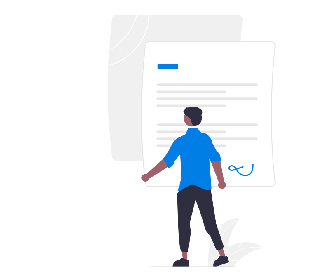What Is a Job Application?
When a potential employee expresses interest in a particular job role, they formally submit a job application to the company. This document can be completed manually or digitally, depending on the recruitment practices of the organization. It is often the first step in the application for the employment process and serves as an initial screening tool for hiring managers.
Key Elements of a Job Application
The following information is included in a well-organized job application form:
Personal Details: Full name, contact information, permanent and current address
Educational Background: Degrees, certifications, and academic achievements
Work Experience: Past roles, duration of employment, and responsibilities handled
Skills and Competencies: Both technical and soft skills relevant to the job
References: Names and contact details of professionals who can vouch for the applicant’s credibility
Declaration and Signature: Confirmation of truthfulness of the provided information
A digital application might also feature resume upload options, video interview links, or personality assessments depending on the hiring structure.
Purpose of Job Application
A job application is a candidate's official request to be considered for a particular position inside a business. However, its purpose extends beyond a mere expression of interest. It is a strategic and administrative tool designed to assist both the candidate and the employer throughout the recruitment lifecycle.
The purpose of a job application can be viewed through multiple lenses: administrative, legal, strategic, and organizational. It provides structure to the hiring process, maintains consistency, enables fair candidate comparison, and ensures that essential data is collected uniformly.
1. Centralized Collection of Candidate Information
One of the primary purposes of a job application form is to centralize all necessary candidate information into a standardized format. Unlike resumes, which vary in structure and content, job applications ensure that hiring managers receive comparable data from all applicants, including personal details, educational qualifications, employment history, and references. This uniformity simplifies the screening and evaluation process significantly.
2. Streamlining the Screening Process
In high-volume recruitment scenarios, going through hundreds of resumes can be overwhelming and inefficient. Job applications present key information in a systematic manner that allows HR professionals to filter candidates based on defined criteria such as years of experience, certifications, or industry-specific skills. This contributes to faster decision-making and reduced hiring time.
3. Ensuring Legal and Regulatory Compliance
A job application often includes declarations related to the accuracy of the information provided, consent for background verification, and agreements to abide by company policies. These legal statements are critical for organizations, particularly in sectors like finance, education, or healthcare where hiring procedures are heavily regulated. The signed or acknowledged application form serves as a formal document of agreement, protecting the organization against potential disputes or claims.
4. Demonstrating Candidate's Commitment and Professionalism
The act of completing a job application form, especially one that is detailed demonstrates a candidate's seriousness about the opportunity. Candidates who take the time to fill out a form accurately and completely often reflect a higher level of professionalism and attention to detail, which are desirable traits in most roles.
5. Enhancing Employer Branding and Candidate Experience
A thoughtfully designed application process reinforces the employer's commitment to transparency, fairness, and professionalism. Whether hosted on a company website or integrated within an Applicant Tracking System (ATS) , the interface, ease of use, and clarity of the application process all influence the applicant's perception of the organization. When done well, it enhances the company’s employer brand and attracts high-quality talent.
6. Providing a Consistent Framework for Interviews
By gathering the same categories of information from each applicant, job applications help standardize the interview process. Interviewers can refer to specific entries in the application to ask questions, clarify doubts, and verify experience or qualifications, leading to more meaningful and targeted interviews.
7. Recordkeeping and Future Reference
Organizations often retain job applications for future hiring needs or for reference during onboarding and orientation. If a candidate isn’t selected for one role but fits another opening, their application serves as a valuable internal resource for future recruitment cycles. Maintaining these records also assists in compliance audits and workforce analytics.
Why Job Application Is Important in the Hiring Process?
The job application is a cornerstone in structured and ethical hiring practices. For HR teams, it is not merely a form to review; it is a record, a filter, and an instrument of legal and professional compliance.
1. Promotes Fairness and Consistency
Every candidate provides the same set of details in a job application form. By ensuring that all applications are evaluated using the same standards, this standardization serves to lessen bias.
2. Simplifies Data Management
By using application forms, especially digital ones, HR departments can easily store, retrieve, and analyze candidate data across multiple job openings and timelines.
3. Supports Compliance and Record-Keeping
In regulated industries or where background verification is essential, having a signed application form can be a critical requirement for audit trails and compliance checks.
4. Enables Better Candidate Matching
When combined with technologies such as AI and applicant tracking systems, application data can help organizations match job roles with the most suitable candidates more accurately.
5. Reflects Employer Branding
A professionally designed application process reflects the employer’s seriousness and commitment to hiring top talent, positively influencing candidate perception.
Real-World Use Case of Job Application
For instance, companies hiring in bulk or across multiple roles rely on job applications to organize and streamline the process. A recruitment team receiving hundreds of resumes per job posting may struggle with unstructured information, but a job application form ensures they have all the data needed for accurate shortlisting.
Looking to streamline your recruitment process with customized job application forms?
Qandle’s Recruitment Management System offers configurable application workflows, seamless candidate tracking, and automated screening tools to help HR teams hire smarter and faster.
People also look for


 Back to Glossary
Back to Glossary